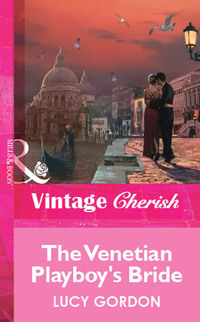Kitap dosya olarak indirilemez ancak uygulamamız üzerinden veya online olarak web sitemizden okunabilir.
Kitabı oku: «The Venetian Playboy's Bride»
Harlequin Romance® presents a brand-new trilogy from bestselling author
LUCY GORDON
The Counts of Calvani

These proud Italian aristrocrats are about to propose!
The Calvani family is a prosperous, aristocratic Italian family headed by Count Francesco Calvani.
He has three nephews:
Guido—charming, easygoing and wealthy in his own right, Guido is based in Venice. He’s heir to the Calvani title, but he doesn’t want it….
Marco—aristocratic, sophisticated and very good-looking, Marco is every woman’s dream, managing the family’s banking and investments in Rome….
Leo—proud, rugged and athletic, Leo is a reluctant tycoon, running the family’s prosperous farms in Tuscany.
The pressure is mounting on all three Calvani brothers to marry and produce the next heirs in the Calvani dynasty. Each will find a wife—but will it be out of love or duty…?
Find out in this emotional, exciting and dramatic trilogy:
The Venetian Playboy’s Bride #3744
The Italian Millionaire’s Marriage #3751
The Tuscan Tycoon’s Wife #3760
Don’t miss it!
Dear Reader,
I always love the chance to write about Venice, because that city has been my second home since I married a Venetian. Perhaps that’s why I think Venetians are the most romantic of men (although all other Italians come a close second). They combine emotional intensity with lightheartedness in a way that makes them irresistible.
Guido Calvani, the hero of The Venetian Playboy’s Bride, is like that. He approaches life with a laugh and a conviction that he can make things happen the way he wants. But then, he’s never met anyone like Dulcie, a private detective who’s one step ahead, and it’s only when it’s too late that he discovers she’s tied him in knots.
Their story is played out against Venice with its dark corners and mysterious alleys. In the city on the water nothing is ever quite what it seems, including Guido and Dulcie, who start by hiding their true selves, then learn, through love, to cast their masks aside.
After Guido comes Marco from Rome, cool and self-sufficient. Then Leo, the countryman from Tuscany. And always in the background is their uncle Francesco, Count Calvani, whose colorful life hides a romantic secret that takes them all by surprise.

The Venetian Playboy’s Bride
Lucy Gordon

CONTENTS
CHAPTER ONE
CHAPTER TWO
CHAPTER THREE
CHAPTER FOUR
CHAPTER FIVE
CHAPTER SIX
CHAPTER SEVEN
CHAPTER EIGHT
CHAPTER NINE
CHAPTER TEN
CHAPTER ELEVEN
CHAPTER TWELVE
CHAPTER ONE
GUIDO CALVANI took another turn along the hospital corridor, trying not to think of his uncle, lying behind the closed door, desperately ill.
He was high up on the top floor. At one end of the corridor the window looked out over the heart of Venice, red roofs, canals, little bridges. At the other end was the Grand Canal. Guido stopped and regarded the flashing water, snaking its way through the heart of the little city to where it would reach the Palazzo Calvani, home of the Calvani counts for centuries. By tonight he might have inherited the title, and the thought appalled him.
His mercurial spirits weren’t often depressed. He approached life with an optimism that was reflected in his appearance. His blue eyes might have been born gleaming, and a smile seemed to be his natural expression. At thirty-two, rich, handsome, free, he had no cares, save for the one that now threatened him.
Guido was a man of warm affections. He loved his uncle. But he also loved his freedom, and within a few hours he might have lost them both.
He turned swiftly as two young men appeared from the staircase below.
‘Thank heavens!’ he said, embracing his half-brother Leo, who clasped him back unselfconsciously. With his cousin Marco he merely clapped him on the shoulder. There was a proud reserve about Marco that even the open-hearted Guido had to respect.
‘How bad is Uncle Francesco?’ Marco demanded tersely.
‘Very bad, I think. I called you last night because he’d started to have pains in his chest, but he wouldn’t be sensible and see a doctor. Then early this morning he collapsed in agony, and I sent for an ambulance. We’ve been here ever since. They’re still doing tests.’
‘It surely can’t be a heart attack,’ Leo said. ‘He’s never had one before, and the life he’s led—’
‘Was enough to give any normal man a dozen heart attacks,’ Marco supplied. ‘Women, wine, fast cars—’
‘Women!’ Guido echoed.
‘Three speedboats smashed up,’ Leo recalled.
‘Gambling!’
‘Women!’
‘Skiing!’
‘Mountaineering!’
‘Women!’ They spoke with one voice.
A footstep on the stairs reduced them all to silence as Lizabetta, the count’s housekeeper, appeared among them like doom. She was thin, sharp-faced, elderly, and they greeted her with more respect than they ever showed their uncle. This grim creature was the power in the Palazzo Calvani.
She acknowledged them with a nod that managed to combine respect for their aristocratic status with contempt for the male sex, sat down and took out her knitting.
‘I’m afraid there’s no news yet,’ Guido told her gently.
He looked up as the ward door opened and the doctor emerged. He was an elderly man and had been the count’s friend for years. His grave expression could mean only one thing, and their hearts sank.
The doctor pronounced. ‘Get the silly old fool out of here and stop wasting my time.’
‘But—his heart attack—?’ Guido protested.
‘Heart attack, my foot! Indigestion! Liza, you shouldn’t let him eat prawns in butter.’
Liza glared. ‘Much notice he takes of me,’ she snapped.
‘Can we see him now?’ Guido asked.
A roar from within answered him. In his prime Count Francesco had been known as The Lion of Venice, and now that he was in his seventies nothing much had changed.
The three young men entered their uncle’s room and stood regarding him wryly. He was sitting up in bed, his face framed by his white hair, his blue eyes gleaming.
‘Gave you a fright, didn’t I?’ he bawled.
‘Enough of a fright to bring me all the way from Rome and Leo from Tuscany,’ Marco remarked. ‘All because you’ve been stuffing yourself.’
‘Don’t talk to the head of the family like that,’ Francesco growled. ‘And blame Liza. Her cooking is irresistible.’
‘So you have to gobble it like a greedy schoolboy,’ Marco observed, not noticeably intimidated by addressing the head of the family. ‘Uncle, when are you going to act your age?’
‘I didn’t get to be seventy-two by acting my age!’ Francesco remarked with perfect truth. He pointed at Marco. ‘When you’re seventy-two you’ll be a dried-up stick without a heart.’
Marco shrugged.
The old man indicated Leo. ‘When you’re seventy-two you’ll be more of a country bumpkin than you are already.’
‘That’s cool,’ Leo observed, unruffled.
‘What will I be at seventy-two?’ Guido asked.
‘You won’t. An outraged husband will have shot you long before then.’
Guido grinned. ‘You should know all about outraged husbands, uncle. I heard that only last—’
‘Clear off all of you. Liza will bring me home.’
As soon as they’d escaped the building they leaned against the honey-coloured stone wall and breathed out long sighs of relief.
‘I need a drink,’ Guido said, making a beeline for a small bar beside the water. The others followed him and seated themselves at a table in the sun.
Since Guido lived in Venice, Leo in Tuscany and Marco in Rome they saw each other only rarely, and the next few minutes were occupied by taking stock. Leo was the least altered. As his uncle had said, he was a countryman, lean, hard-bodied, with a candid face and clear eyes. He wasn’t a subtle man. Life reached him directly, through his senses, and he read books only when necessary.
Marco was the same as always, but more so: a little more tense, a little more focused, a little more heedless of ordinary mortals. He existed in a rarefied world of high finance, and it seemed to his cousins that he was happiest there. He lived expensively, buying only the best, which he could well afford. But he did so, less because it gave him pleasure than because it would never have occurred to him to do otherwise.
Guido’s mercurial nature had been born for a double life. Officially he resided at the palazzo, but he also had a discreet bachelor flat where he could come and go, free of critical eyes. He too had intensified, becoming more charming, and more elusive in his determination to remain his own man. He possessed a mulish stubbornness which he hid behind laughter and a sweet temper. His dark hair was a shade too long, curving over his collar with a slight shagginess that made him look younger than his thirty-two years.
Nobody spoke until they were on their second beer.
‘I can’t stand this,’ Guido said at last. ‘Being brought to the brink and then let off is going to finish me. And let off for how long?’
‘What are you raving about?’ Marco demanded.
‘Ignore him,’ Leo grinned. ‘A man who’s just been reprieved is bound to be light-headed.’
‘That’s right, mock me!’ Guido said. ‘By rights it should be you in this mess.’
Leo was his elder brother, but by a trick of fate it was Guido who was the heir. Bertrando, their father, had married a widow whose ‘late’ husband had subsequently turned up alive. By then she had already died giving birth to Leo, leaving him illegitimate. Two years later Bertrando had married again, and his second wife had presented him with Guido.
Nobody had worried about it then. It was a technicality that would cease to matter when Count Francesco married and had a son. But as the years passed with no sign of his marriage the anomaly began to glare. Although the younger son, Guido was legally the only son, and heir to the title.
He hated the prospect. It was a trap waiting to imprison his free spirit. He longed for a miracle to restore Leo’s rights, but Leo didn’t want them either. Only the earth interested him: growing wine, wheat and olives, breeding cattle and horses. He cared for the title no more than Guido.
The only discord between them had come when Guido tried to tempt his brother into legal action to legitimatise himself and stop ‘shirking his duty’. Leo had bluntly replied that if Guido thought he was going to tie himself down to a load of pointless flapdoodle he was even more cretino than he looked. Guido had responded with equal robustness and it had taken Marco to stop an undignified brawl. As the son of Silvio, younger brother to Francesco and Bertrando, he had little chance of the title, and could afford to regard the shenanigans of the other two with lofty amusement.
‘Of course it’s bound to happen one day,’ he mused now, maliciously. ‘Count Guido, father of ten, a man of distinction, fat, sedate, middle-aged, with a wife to match.’
‘That shirt looks like it’s worth a thousand dollars,’ Guido mused, fingering his half-full glass significantly.
‘Only a joke,’ Marco placated him.
‘Not funny.’ Guido took another swallow and sighed mournfully. ‘Not funny at all.’
Roscoe Harrison’s London home was no palace, but it had had as much money lavished on it as the Calvani abode. The difference was that he was a man without taste. He believed in display, and the crude power of cash, and it showed.
‘I buy only the best,’ he was saying now to the fair-haired young woman sitting in his office at the back of the house. ‘That’s why I’m buying you.’
‘You aren’t buying me, Mr Harrison,’ Dulcie said coolly. ‘You’re hiring my skill as a private detective. There’s a big difference.’
‘Well your skill will do me just fine. Take a look at this.’
He thrust a photograph across the desk. It showed Roscoe’s daughter, Jenny Harrison, her dark hair streaming over her shoulders in the Venetian sunlight, listening ardently to a young gondolier playing a mandolin, while another gondolier, with curly hair and a baby face, looked on.
‘That’s the character who thinks he’s going to marry Jenny for her fortune,’ Roscoe snapped, jabbing at the mandolin player with his finger. ‘He’s told her he isn’t really a gondolier, but heir to a count—Calvani, or some such name—but I say it’s a big, fat lie.
‘I’m not an unreasonable man. If he really were a posh nob that would be different. His title, my money. Fair enough. But a posh nob rowing a gondola? I don’t think so. I want you to go to Venice, find out what’s going on. Then, when you’ve proved he’s no aristocrat—’
‘Perhaps he is,’ Dulcie murmured.
Roscoe snorted. ‘Your job is to prove he isn’t.’
Dulcie winced. ‘I can’t prove he isn’t if he is,’ she pointed out.
‘Well, you’ll be able to tell, ’cos you’re top drawer yourself. You’re Lady Dulcie Maddox, aren’t you?’
‘In my private life, yes. But when I’m working I’m simply, Dulcie Maddox, PI.’
She guessed that Roscoe didn’t like that. He was impressed by her titled connections, and when she brushed them aside he felt cheated.
Last night he’d invited her to dinner in order to meet his daughter, Jenny. Dulcie had been charmed by the young girl’s freshness and naïvety. It was easy to believe that she needed protection from a fortune hunter.
‘I want you because you’re the best,’ Roscoe returned to his theme. ‘You’re posh. You act posh. You look posh—not your clothes because they’re—’
‘Cheap,’ she supplied. The jeans and denim jacket had been the cheapest thing on the market stall. Luckily she had the kind of tall, slender figure that brought out the best in anything, and her mane of fair hair and strange green eyes drew admiration wherever she went.
‘Inexpensive,’ Roscoe said in one of his rare ventures into tact. ‘But you look posh, in yourself. You can tell aristocrats because they’re so tall and slim. Probably comes from eating proper food while the peasants had to make do with stodge.’
‘Maybe with the others,’ Dulcie said. ‘But with me it came from not having enough to eat because all the family money was blown on the horses. That’s why I’m working as a private investigator. I’m as poor as a church mouse.’
‘Then you’ll need a load of new gear to be convincing. I keep an account at Feltham’s for Jenny. I’ll call and tell them to do you proud at my expense. When you reach the Hotel Vittorio you’ve got to look the part.’
‘The Vittorio?’ She looked quickly out of the window, lest he guess that this particular hotel had a special meaning for her. It was only a few weeks ago that she had been planning her honeymoon in that very hotel, with a man who’d sworn eternal love.
But that was then. This was now. Love had vanished with brutal suddenness. She would have given anything to avoid the Vittorio, but there was no help for it.
‘Most expensive hotel in Venice,’ Roscoe said. ‘So buy the clothes, then get out there fast. Fly first class. No cheap economy flights in case he checks up on you.’
‘You mean he might employ a private detective too?’
‘No knowing. Some people are devious enough for anything.’
Dulcie maintained a diplomatic silence.
‘Here’s a cheque for expenses. It’s not enough to look rich. You’ve got to splash it around a bit.’
‘Splash it around a bit,’ Dulcie recited, glassy eyed at the size of the cheque.
‘Find this gondolier, make him think you’re rolling in money, so he’ll make up to you. When you’ve got him hooked let me know. I’ll send Jenny out there, and she’ll see the kind of man he really is. She won’t believe it, but the world is full of jerks on the look out for a rich girl.’
‘Yes,’ Dulcie murmured with feeling. ‘It is.’
On the night of Count Francesco’s return, supper at the palazzo was formal. The four men sat around an ornate table while a maid served dish after dish, under the eagle eyes of Liza. To the count this was normal, and Marco was comfortable with it. But the other two found it suffocating, and they were glad when the meal was over.
As they prepared for escape the count signalled for Guido to join him in his ornate study.
‘We’ll be at Luigi’s Bar,’ Marco called back from the front door.
‘Couldn’t this wait?’ Guido pleaded, following his uncle into the study.
‘No, it can’t wait,’ Francesco growled. ‘There are things to be said. I won’t bother to ask if the stories I’ve heard about you are true.’
‘They probably are,’ Guido agreed with a grin.
‘It’s time it stopped. After all the trouble I’ve taken, making sure you met every woman in society.’
‘I’m nervous with society women. They’re all after just one thing!’
‘What!’
‘My future title. Half of them never look at me properly. Their gaze is fixed on the Calvani honours.’
‘If you mean that they’re prepared to overlook your disgraceful way of life out of respect for your dignity—’
‘Dignity be blowed. Besides, maybe I don’t want a woman who’ll overlook my “disgraceful” life. It might be more fun if she was ready to join in.’
‘Marriage is not supposed to be fun!’ Francesco thundered.
‘I was afraid of that.’
‘It’s time you started acting like a man of distinction instead of spending your time with the Lucci family, fooling about in gondolas—’
‘I like rowing a gondola.’
‘The Luccis are fine hard-working people but their lives take one path and yours another—’
In a flash Guido’s face lost its good humour and hardened. ‘The Luccis are my friends, and you’ll oblige me by remembering that.’
‘You can be friends—but you can’t live Fede’s life. You’ve got to make your own way. Perhaps I shouldn’t have allowed you to see so much of them.’
‘You didn’t allow me,’ Guido said quietly. ‘I didn’t ask your permission. Nor would I. Ever. Uncle, I have the greatest respect for you, but I won’t allow you to run my life.’
When Guido spoke in that tone the merry charmer vanished, and there was something in his eyes that made even the count wary. He saw it now and fell silent. Guido was instantly contrite.
‘There’s no harm in it,’ he said gently. ‘I just like to row. It keeps me fit after my other “excesses”.’
‘If it were just rowing,’ Francesco snorted, recovering lost ground. ‘But I’ve heard you even sing “O sole mio” for tourists.’
‘They expect it. Especially the British. It’s something to do with ice cream cornets.’
‘And you pose with them for photographs.’ The count took out a snapshot showing Guido in gondoliering costume, serenading a pretty, dark-haired girl, while another gondolier, with curly hair and a baby face, sat just behind them.
‘My nephew,’ he growled, ‘the future Count Calvani, poses in a straw hat.’
‘It’s disgraceful,’ Guido agreed. ‘I’m a blot on the family name. You’ll just have to marry quickly, have a son, and cut me out. Rumour says you’re still as vigorous as ever, so it shouldn’t be—’
‘Get out of here if you know what’s good for you!’
Guido fled with relief, leaving the building and slipping away down tiny, darkened streets. As he reached the Grand Canal he saw a collection of seven gondolas, moving side by side. It was a ‘serenade’, a show put on to please the tourists. In the central boat the baby-faced young man from the photograph stood singing in a sweet tenor that drifted across the water. As the song came to an end there was applause, and the boats drifted in to their moorings.
Guido waited until his friend, Federico Lucci, had assisted his last passenger to disembark before hailing him.
‘Hey there, Fede! If the English signorina could hear you sing like that she would follow you to the ends of the earth,’ he said. ‘What’s the matter?’ for Fede had groaned. ‘Doesn’t she love you any more?’
‘Jenny loves me,’ Fede declared. ‘But her Poppa will kill me before he lets us marry. He thinks I’m only after her money, but it isn’t true. I love her. That time you met, didn’t you think she was wonderful?’
‘Wonderful,’ Guido said, diplomatically concealing his opinion that Jenny was a pretty doll who lacked spice in her character. His own taste was for a woman who could offer a challenge, lead him a merry dance and give as good as she got. But he was too kind a friend to say so.
‘You know I’ll help in any way I can,’ he said warmly.
‘You’ve already helped us so much,’ Fede said, ‘letting us meet in your apartment, covering for me on the gondola—’
‘That’s nothing. I enjoy it. Let me know when you want me to do it again.’
‘My Jenny has returned to England. She says she will reason with her Poppa, but I’m afraid she may never return.’
‘If it’s true love, she’ll come back,’ Guido insisted.
Fede gave a shout of laughter and thumped him on the shoulder. ‘What do you know about true love? With you it’s here-today-and-gone-tomorrow. If they mention marriage you dive for cover.’
‘Sssh!’ Guido looked hunted. ‘My uncle has ears everywhere. Now come on, let’s join Leo and Marco at Luigi’s, and we can all get drunk in peace.’
Two days later Dulcie flew to Venice, landing at Marco Polo Airport and waiting, with an air of aloof grandeur, while her luggage was loaded onto the Vittorio’s private motor launch.
It was early June, and as the boatman started the trip across the lagoon the sun was high in the sky and the light glinted on the water. Surrounded by so much bright beauty Dulcie briefly forgot her sadness.
To her right she could see the causeway linking Venice to the mainland. A train was making its way across. On the other side the lagoon stretched far away to the horizon.
‘There, signorina,’ the boatman said, speaking with the pride all Venetians feel in their city.
What she saw at first were shining orbs, gradually resolving themselves into golden cupolas, gleaming in the sun. The city itself, delicate and perfect, came gradually into view, taking her breath away with its beauty. She stayed motionless, not wanting to miss anything, as the motor boat slowed down.
‘We have to enter Venice gently,’ the driver explained, ‘so that we do not cause any large waves. This is the Cannaregio Canal, which will take us to the Grand Canal, and the Vittorio.’
Suddenly the brightness of the lagoon was blotted out and they were drifting in shadow between high buildings. Dulcie resumed her seat and leaned back, looking up to the narrow strip of sky overhead. After a few minutes they were in sunlight again, heading down the Grand Canal to a magnificent seventeenth-century palace. The Hotel Vittorio.
At the landing-stage hands reached down to help her up the steps and guide her into the hotel. She made a stately entrance, followed by porters bearing her luggage in procession.
‘The Empress Suite,’ declared a lofty individual on the desk.
‘The Emp—?’ she echoed, dismayed. ‘Are you sure there hasn’t been a mistake?’
But she was already being swept away to the third floor where gilded double doors opened before her and she walked into the palatial apartment. Everything about it was designed to look like the abode of an empress, including the eighteenth-century furniture. On one wall hung a portrait of the beautiful, young Empress Elisabeth of Austria, painted in the nineteenth century when Venice had been an Austrian province.
To one side was another pair of double doors, through which Dulcie found her bedroom, with a bed large enough to sleep four. She gasped, overwhelmed by such opulence. A maid appeared, ready to unpack her luggage. Just in time she remembered Roscoe’s orders to ‘splash it about a bit’ and distributed tips large enough to get herself talked about even in this place.
When everyone had gone she sat in silence, trying to come to terms with the shock of being here, alone, when she should have been here as a blissful bride.
She forced herself to confront the memory of Simon, painful though it was. He’d assumed that Lady Dulcie Maddox, daughter of Lord Maddox, must have a potful of family money hidden somewhere. He’d courted her ardently, using practised words to sweep her away in a magic balloon, to a place where everything was love and gratification.
But the balloon had fallen to earth, with her in it.
Simon had lived lavishly—all on credit, as she’d later discovered. She hadn’t cared about his money, only about his love. But the one was as illusory as the other.
He’d shown her the Hotel Vittorio’s brochure one evening when they were dining at the Ritz. ‘I’ve already made our honeymoon booking,’ he’d said, ‘in the Empress Suite.’
‘But darling, the cost—’
‘So what? Money is for spending.’
She’d spoken with passionate tenderness. ‘You don’t have to spend a lot on me. Money isn’t what it’s about.’
His quizzical frown should have warned her. ‘No, sweetie, but it helps.’
Then she’d said—and the memory tormented her still— ‘You don’t think I’m marrying you for your money do you? I love you, you. I wouldn’t care if you were as poor as I am.’
She could still see the wary look that came into his eyes, and sense the chill that settled over him. ‘This is a wind up, right? As poor as Lady Dulcie Maddox.’
‘You can’t eat a title. I haven’t a penny.’
‘I heard your grandfather blew twenty grand at the races in one day.’
‘That’s right. And my father was the same. That’s why I haven’t a penny.’
‘But you lot have all got trust funds, everyone knows that.’
The truth had got through to her now, but she fought not to face it. ‘Do I live like someone with a trust fund?’
‘Go on, you’re just slumming.’
She’d finally convinced him that she wasn’t, and that was the last time she saw him. Her final memory was of him snatching a credit card statement from his pocket and tossing it at her with the bitter words, ‘Do you know how much money I’ve spent on you? And for what? Well, no more.’
Then he stormed out of the Ritz, leaving her to pay for the meal.
And that had been that.
Sitting in the quiet of the Empress Suite Dulcie knew that it was time to pull herself together. Now there was another fortune hunter, but this time he was the prey and she the pursuer, seeking him out for retribution, the avenger of all women.
She showered in a gold and marble bathroom and chose something to wear for her first outing ‘on duty’. She finally left the hotel arrayed in an orange silk dress, with a delicate pendant of pure gold. Gold earrings and dainty gilt sandals completed the ensemble. So much gold might be overdoing it, but she needed to make an impression, fast.
When she’d finished she took a final look at the picture, to make sure his face was imprinted on her mind. She dismissed the baby-faced boy at the back. There was the one she wanted, playing the mandolin, over-flowing with confidence, smiling at Jenny, no doubt serenading her with honeyed words. The rat!
Finding one gondolier among so many was a problem, but she’d come prepared. Guidebooks had told her about the vaporetto, the great water buses that transported passengers along the Grand Canal, so she headed for one of the landing stages, boarded the next boat, and took up a position in the front, armed with powerful binoculars.
For an hour the vaporetto moved along the canal, criss-crossing to landing stages on each side, while Dulcie searched for her quarry, without success. At the end of the line she turned back and started again. No luck this time either, and she was almost about to give up when suddenly she saw him.
It was only a glimpse, too brief to be sure, but there was the gondola gliding between two buildings while she frantically focused the binoculars, catching him clearly only at the last moment.
The vaporetto was about to cast off from a landing stage. Dulcie moved fast, jumping ashore just in time and looking desperately about her. The gondola had vanished. She plunged down an alley between tall buildings to a small canal at the far end. No sign of him there, but he must be somewhere to her left. She made for a tiny bridge, tore over it and into another dark alley.
At the far end was another small canal, another bridge. A gondola was heading towards her. But was it the same one? The gondolier’s face was hidden by a straw hat. She placed herself on the bridge, watching intently as the long boat neared, the oarsman standing at the far end.
‘Lift your head,’ she agonised. ‘Look up!’
He had almost reached the bridge. In a moment it would be too late. Driven by desperation she wrenched off one of her shoes and tossed it over the side. It struck his hat, knocking it off, before landing exactly at his feet.
Then he looked up, and there was the face she’d come to Venice seeking, the face of the mandolin player. Eyes of fierce, startling blue, set in a laughing face, seemed to seize her, hold her, almost hypnotise her, so that she found herself smiling back.
‘Buon giorno, bella signorina,’ said Guido Calvani.
Ücretsiz ön izlemeyi tamamladınız.









